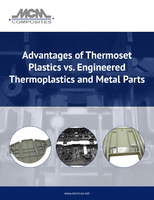ASTM invites papers for sensor technologies symposium.
Press Release Summary:
Papers are invited for 4th Symposium on the Evaluation of Existing and New Sensor Technologies for Fatigue, Fracture and Mechanical Testing to be held May 7-8, 2014 in Toronto, Ontario. Papers are solicited in areas such as advanced noncontact strain, displacement, and velocity measuring techniques; deformation and strain measurement in extreme environments; advanced techniques for crack length and initiation determination; and progress in standard development.
Original Press Release:
Papers are Invited for ASTM Symposium on Sensor Technologies for Fatigue, Fracture and Mechanical Testing
W. CONSHOHOCKEN, Pa., —Papers are invited for the 4th Symposium on the Evaluation of Existing and New Sensor Technologies for Fatigue, Fracture and Mechanical Testing to be held May 7-8, 2014, at the Sheraton Toronto in Toronto, Ontario. Sponsored by ASTM International Committee E08 on Fatigue and Fracture, the symposium will be held in conjunction with the standards development meetings of the committee.
The symposium is intended to provide a forum to disseminate state-of-the-art advances in sensor technology as well as to identify the limitations of existing sensor technology as it applies to fatigue, fracture and mechanical testing. The program will provide an opportunity to learn about both new and old issues with existing sensor technology as applicable to ASTM fatigue, fracture or mechanical testing standards. Papers are solicited in the following areas:
• Advanced noncontact strain, displacement and velocity measuring techniques (e.g., digital image correlation, metrology, etc.);
• Deformation and strain measurement in extreme environments (e.g., elevated temperatures, impact, etc.) and complex material systems (e.g., advanced metallic materials, composite materials, including welds);Â
• Advanced techniques for crack length and initiation determination (e.g., eddy current, DCPD/ACPD, acoustic emission, etc.);
• Issues with application of commonly accepted standard sensors in fatigue and fracture testing; and
• Progress in standard development.
To participate in the symposium, presenters/authors must submit a 250-300 word preliminary abstract by June 12, 2013. The abstract must include a clear definition of the objective and approach of the work discussed, pointing out material that is new, and present sufficient details regarding results. The presentation and manuscript must not be of a commercial nature nor can it have been previously published. The symposium chairmen will notify you by July 8, 2013, of your paper’s acceptability for presentation at the symposium.
Visit www.astm.org/E08CFPMay2014 to submit your abstract and for additional information.
Additional technical information is available from symposium co-chairmen Jidong Kang, CanmetMATERIALS, Hamilton, Ontario (phone: 905- 645-0820; jkang@nrcan.gc.ca); David Jablonski, Thermo Fisher Scientific, Tewksbury, Mass., (phone: 978-284-6908; david.jablonski@thermofisher.com); and David Dudzinski, National Research Council Canada, Ottawa, Ontario (phone: 613-998-6473; david.dudzinski@nrc.ca).
ASTM International is one of the largest international standards development and delivery systems in the world. ASTM International meets the World Trade Organization (WTO) principles for the development of international standards: coherence, consensus, development dimension, effectiveness, impartiality, openness, relevance and transparency. ASTM standards are accepted and used in research and development, product testing, quality systems and commercial transactions.
ASTM Staff Contact: Hannah Sparks, Phone: 610-832-9677; hsparks@astm.org




